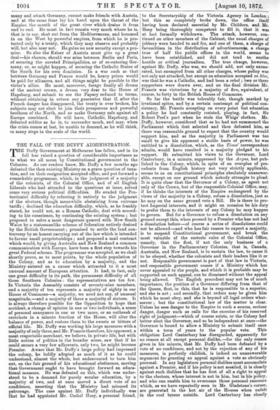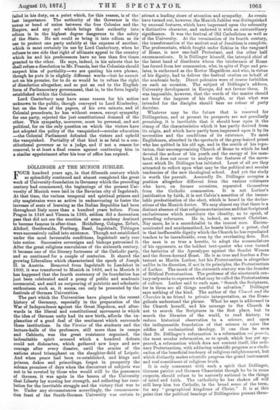THE FALL OF THE DUFFY ADMINISTRATION. THE Duffy Government at Melbourne
has fallen, and in its
fall has raised a question of considerable importance as to what we all mean by Constitutional government in the Colonies. As our readers know, Mr. Duffy a few months ago defeated the then existing Ministry on a grave question of taxa- tion, and on their resignation accepted office, and put forward a remarkable programme, which, in the judgment of a majority of the colonists, of the Colonial Office, and of all English Liberals who had attended to the questions at issue, solved some very serious political difficulties. He evaded the Pro- tectionist difficulty by referring it entirely to the judgment of the electors, though meanwhile abstaining from extreme tariffs ; declined the education difficulty, which, as he frankly stated, he "could not, as a Roman Catholic, deal with accord- ing to his conscience, by continuing the existing system ; but proposed to solve a most dangerous quarrel with New South Wales by a statesmanlike scheme of federation entirely desired by the British Government ; promised to settle the land con- troversy by an honest carrying out of the law which is intended to favour small proprietorships ; and proposed a mail contract which would, by giving Australia and New Zealand a common communication with Europe, have been a first step towards his great Federal scheme. The programme was accepted, as we shall shortly prove, as to most points, by the whole population of the Colony, and as to education by a majority, and the Ministry entered on a career which attracted to it a most unusual amount of European attention. It had, in fact, only one great difficulty in its path, the permanent difficulty of all these Southern Colonies : the representatives are too few. In Victoria the Assembly consists of seventy-nine members, and a majority of ten represents a majority of eighty in our House of Commons—a majority, we need not say, of unusual magnitude,—and a majority of three a majority of sixteen. It is always therefore possible for the Opposition to hope that accident, a change of opinion in one or two individuals, a sense of personal annoyance in one or two more, or an outbreak of crotchets in a minute fraction of the House, will alter the balance of power, and restore them to the sweets or bitters of official life. Mr. Duffy was working his large measures with a majority of only three, and Mr. Francis therefore, his opponent, a most respectable merchant, we believe, in private life, but with little notion of politics in the broader sense, saw that if he oould secure a very few adherents, only two, he might become Premier. Aware that Mr. Daffy's large policy had impressed the colony, he boldly adopted as much of it as he could understand, almost the whole, but endeavoured to turn him out, on the fair ground of his educational abstinence, moving that Government ought to have brought forward an educa- tional measure. He was defeated on this, which was under- stood to be a demand for purely secular education, by a majority of two, and at once moved a direct vote of no confidence, asserting that the Ministry had misused its patronage. The case avainst Mr. Duffy individually was that he had appointed Mr. Cashel Hwy, a personal friend,
many and attack Germany, cannot make friends with Austria, to the Secretaryship of the Victoria Agency. in London ; but this so completely broke down, the office itself having been declared essential by Mr. Childers, and Mr. Hoey being thoroughly competent to fill it, that it was at last formally withdrawn. The attack, however, con- tinued on other members of the Cabinet, the usual charges of jobbery were banded to and fro, and one of them, a charge of favouritism in the distribution of advertisement'', a charge true of half the public offices in the world, seems to have been established, and did not tend to soothe hostile or critical journalism. The true charge, however, against Mr. Duffy, who was, we should add, not only exone- rated, but exempted from all other charges, whose policy was not only not attacked, but except on education accepted en bloc, was that he was a Catholic, and had been a rebel ; two or three supporters were drawn over, and on the final division Mr. Francis was victorious by a majority of five, equivalent, of course, to forty in the British House of Commons.
So far the battle was tolerably fair, though marked by irrational spites, and by. a certain contempt of political con- sistency, Mr. Francis accepting on every point but education a policy he had constantly resisted, playing, in fact, Sir Robert Peel's part when he stole the Whigs' clothes. Mr. Duffy, however, considered that as he had not summoned the Parliament which first selected and then defeated him, as there was reasonable ground to expect that the country would support him, and as the majority in Parliament was too small to give his opponent a stable basis of power, he was entitled to a dissolution, which, as the Times' correspondent admits, would have resulted in a majority pledged to his support. He submitted his views to the Governor, Lord Canterbury, in a minute, suppressed by the Argus, but pub- lished in the Colony, which, in spite of an overplus of pre- cedents from English history not very strictly applicable, seems to us on constitutional principles absolutely unanswer- able, except on one ground which nobody attempts to plead. It is quite clear that the Govamor of a Colony, as agent not only of the Crown, but of the responsible Colonial Office, may, if he thinks the interests of the Empire endangered by the views of the majority in a Colony, refuse a dissolution, just as he may on the same ground veto a Bill. He is there to pro- tect Imperial interests, and- it might on occasion be his duty to prefer them to the interests of any Colony he may happen to govern. But for a Governor to refuse a dissolution on any ground except this, when pressed by a Premier who has not had a dissolution before—of course a series of dissolutions could not be allowed—and who has fair reason to expect a majority, is to suspend Constitutional government, and break the most valuable of the esoteric rules of the Colonial Office, namely, that the first, if not the only business of a Governor in the. Parliamentary Colonies, that is, Canada, Australia, and New Zealand, is to sustain the law, to cause it to be obeyed, whether the colonists and their leaders like it or not. Responsible government is part of that law in Victoria, and responsible government ceases if a Ministry which has never appealed to the people, and which it is probable may be supported on such appeal, can be dismissed without the appeal being allowed. The English precedent may not be of much importance, the position of a Governor differing from that of
the Queen, first, in this, that he is responsible to a superior, and she is not ; and secondly, that orders may be given him which he must obey, and she is beyond all legal orders what- soever ; but the constitutional law of the matter is clear. Unless he sees danger to the Empire in such a course, serious danger, danger such as calls for the exercise of his reserved right of judgment—which of course exists, or the Colony had better elect the Governor, and so be independent at once—the Governor is bound to allow a Ministry to submit itself once within a term of years to the popular vote. This obligation. Lord Canterbury has disregarded, apparently for no reason at all except personal dislike, —for the only reason given in his minute, that Mr. Duffy had been defeated by a vote of no confidence, and not by the rejection of any of his measures, is perfectly childish, is indeed an unanswerable argument for granting an appeal against a vote so obviously personal. In any legislature personal dislikes must accumulate against a Premier, and if his policy is not assailed, it is clearly against such dislikes that he has first of all a right to appeal to the electors, whose interest is not in him, but in his policy, and who can enable him to overcome those personal rancours which, as we have repeatedly seen in Mr. Gladstone's career, are generated in the hot air of the Houses when unfelt in the cool breeze outside. Lord Canterbury has clearly failed in his duty, on a point which, for this reason, is of the last importance. The authority of the Governor is the nexus or bond of union between the free Colonies and the Empire, and any act which brings that authority into odium is in the highest degree dangerous to the safety of the State. No act could so bring it into odium as its use to protect one party unfairly at the expense of another, which is most certainly its use by Lord Canterbury, when he refuses to one side that right of ultimate appeal to the country which he and his predecessors have no less than five times granted to the other. He says, indeed, in his minute that he shall refuse a dissolution to Mr. Francis, lest the Colonists should suspect him of partiality—we are quoting his own phrase, though he puts it in slightly different words—but he cannot act on his promise, for to do so would be to refuse the right of dissolution altogether, and so put an end to the English form of Parliamentary government, that is, to the form legally established within the Colonies.
Lord Canterbury may have some reason for his action unknown to the public, though conveyed to Lord Kimberley, but on the face of the papers, of his own minute, and of Colonial precedents, he has without reason, except sympathy for one party, rejected the just constitutional demand of the other. This sympathy, moreover, must be personal, and not political, for on the only question on which the victors have not adopted the policy of the vanquished—secular education —the Colonial Parliament defeated the victors and upheld the vanquished. Partiality of that kind is as fatal to a con- stitutional governor as to a judge, and if not a reason for removal, is at least a final reason against continuing him in a similar appointment after his tour of office has expired.

































 Previous page
Previous page